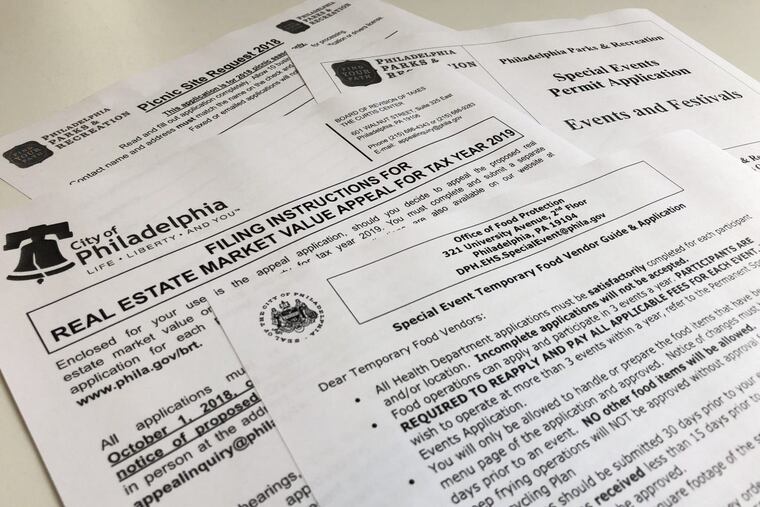10 billion hours of paperwork!? Philadelphia, other cities aim to simplify those forms
Ever looked at government forms and wondered why they were so complicated? Americans spend 10 billion hours filling out government paperwork every year.

Orlando Almonte, who works in Philadelphia's Office of Immigrant Affairs, fields complaints from people who can't access interpreters when they seek government services. They are told to fill out complaint forms, which are translated into their native languages.
However, he said they often have problems with the forms — not with the translations — but "because things weren't designed the right way in English."
"Just having the form in plain English would be a huge step forward," said Almonte, language access program manager. "I know it's an overwhelming document."
And he's the one who designed it, drawing from similar forms in other cities.
Government paperwork eats up a decent chunk of Americans' lives. In fact, every year, Americans spend 10 billion hours filling out federal government forms, according to a study by the Office of Management and Budget.
And often, forms are residents' first interaction with their local governments. Bad experiences with flawed forms can sour the relationships from the beginning. And, as in Philadelphia, many people who design government paperwork have no experience in ways of making it user-friendly.
These are problems that governments across the country and around the world acknowledge.
Last summer, Washington — an international capital of red tape — hosted its first public workshop, called Form-a-Palooza, to redesign city forms. It's bringing it back this year for a new stack of documents, due to popular demand. Austin, Texas, is planning a similar event. Boston, New Orleans, Minneapolis, and Las Vegas and the governments of Canada and Australia are interested in hosting their own, as are the state governments of New Jersey and Arizona.
For anyone in Philadelphia who has looked at a form and thought, What were they thinking?, the city is aware it has a problem and is asking for help. It is hosting its own public workshop Saturday, seeking input from residents, city staff, and user-design experts to redesign city forms to make them easier to understand and quicker to fill out. The goal is to save city employees time and money and ease frustration for staff, residents, and businesses.
The effort is part of the Kenney administration's push to make interactions with the city easier and erase barriers to accessing services, said Anjali Chainani, director of policy in the mayor's office and GovLabPHL, a multi-agency team that aims to tackle local government challenges. The city plans to launch its new website in the coming months. Direct feedback about city documents and the lack of people using some of them showed officials they needed to make changes.
"Forms are a barrier," Chainani said. "We have certainly heard that."
Officials asked agencies for forms they should redesign and are starting with six: tax appeals; a health department application for beer garden approval and permitting; the language-access denial complaint; a new grant application nonprofits can use to promote neighborhood business districts; a special events application; and one for businesses that want to install generators and fire pumps.
Sami Jarrah, chief operating officer of the Philadelphia Department of Public Health, said that the last one is particularly "unfriendly" and hopes to simplify his department's paperwork.
"We've all filled out that confusing form that doesn't make sense," he said. "So we're trying to be vulnerable and open to feedback."
Last year, one of the forms Washington redesigned was its driver's license application, particularly the section that asked for medical history. Officials there noticed residents fell into a routine after answering the first couple of questions, said Karissa Minnich, operations analyst at The Lab @ DC in the city administrator's office, Washington's version of GovLabPHL.
"At this point, we start to lose you, and you just start checking no, no, no," she said. People said they didn't wear corrective lenses on the form "and you would look up at the person and they were wearing glasses."
The corrective-lenses question moved to the top of the list.
More than 100 people have registered for Saturday's workshop in Philadelphia at 9:30 a.m. on the 16th floor of the Municipal Services Building. The city plans to unveil its new forms in the fall.